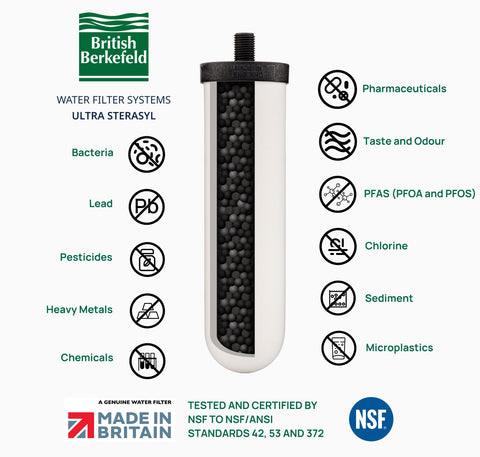What Does a TDS Meter Reading Mean for your Water Filter?


A lot of people—and a number of water filter companies—would have you believe that TDS (total dissolved solids) meter readings are the best measure of water’s overall suitability for drinking, which is totally false.
TDS meters are generally easy to use, and while they can tell you certain things about your water, a TDS meter cannot tell you if your water is safe to drink based solely on the levels of total dissolved solids. Contrary to some of the advertising used by reverse osmosis (RO) system and water pitcher brands you may have seen or heard about, a TDS meter only tells a small part of the story when it comes to evaluating the suitability of water for drinking.
What Can a TDS Meter Tell You? How Does It Work?
Dissolved solids in water such as salts, minerals and heavy metals contain charged particles: negatively charged (anions), and positively charged (cations). Most TDS meters simply use electrodes to measure the resulting electrical conductivity of the water, which the meter converts to a TDS value.
Water with higher levels of dissolved solids will have greater electrical conductivity (and thus higher TDS meter readings), and water with lower levels of dissolved solids will have a lower electrical conductivity (lower TDS meter readings). TDS meter readings are usually expressed in parts per million (ppm), which is also the same as mg/L.
TDS meters can be useful for confirming the removal of total dissolved solids if your home or business utilizes a water distillation or reverse osmosis system. TDS readings can also help you evaluate the hardness of your water and if a water softener system might be needed, or if scale buildup/deposits in your pipes might be related to excess minerals present in your water.
What are Examples of Total Dissolved Solids?
Dissolved solids include salts, minerals (many of which can be beneficial to your health) and heavy metals (which may be bad for you). Some of the most common dissolved solids include aluminum, calcium, magnesium, chloride, potassium, sulfate, nitrate, silica, iron, lead, potassium, sodium and zinc.
What Can a TDS Meter Not Measure?
TDS meters can only measure the levels of electrical conductivity in drinking water caused by dissolved solids. Some models can measure water temperature, pH level and salinity as well. However, TDS meters cannot tell you which dissolved solids (good or bad) or contaminants might be present. For a specific breakdown of dissolved solids or other contaminants in your water, a more thorough water test is required.
And because a TDS meter only detects charged ions, a TDS meter cannot measure uncharged contaminants. Uncharged contaminants include a number of contaminants that affect the safety of drinking water.
Some of the more concerning uncharged contaminants that can be found in drinking water and are not detected by a TDS meter include, but are not limited to:
- Perfluorinated “forever chemicals” such as PFAS
- Potentially lethal biological microorganisms/pathogens such as viruses, bacteria and parasites such as cryptosporidium and giardia, etc.
- Pesticides and other toxic chemicals
- Lead
- Hexavalent chromium
- Fluoride
- Pharmaceuticals
- Petroleum products
- Arsenic
- Chlorine
- Other various types of contaminants that could be present in your drinking water
The Bottom Line
Again, TDS meters can only measure “nuisance chemicals” affecting taste, odor and appearance, but a TDS meter won’t tell you if (or which) much more potentially harmful contaminants could be present in your drinking water that could present both immediate health risks (biological contaminants or toxic chemicals) or long-term health risks (such as PFAS, lead, etc.). Relying on a TDS meter to determine if drinking water is truly suitable for your family to consume is a risky and foolish gamble at best.
Moreover, it should be noted that a lot of water filter companies—some perhaps dishonestly—continue to run ads showing a TDS meter displaying a low reading such as “0” or “5” on the screen, and implying or even directly stating that due to low TDS readings, the water filtered by their system is the best or safest for you to drink.
Skip the TDS Meter—Choose a Proven and Powerful Water Filtration System
Berkey® systems equipped with authentic Black Berkey® Elements have been tested by accredited, independent third-party labs to remove or reduce 250+ typical contaminants in tap water sources, including the reduction of many harmful contaminants that are not detected by TDS meters.
Berkey® systems were originally designed for extreme use for emergency preparedness, disaster relief and off-grid activities, and are also now used every day in millions of homes around the world by discerning consumers who have declared water independence and trust the quality of Berkey® systems to meet their drinking water needs. Berkey® systems are available in eight sizes and provide economical, long-lasting water filtration for just pennies a gallon. No electricity, tools, or plumbing required.




